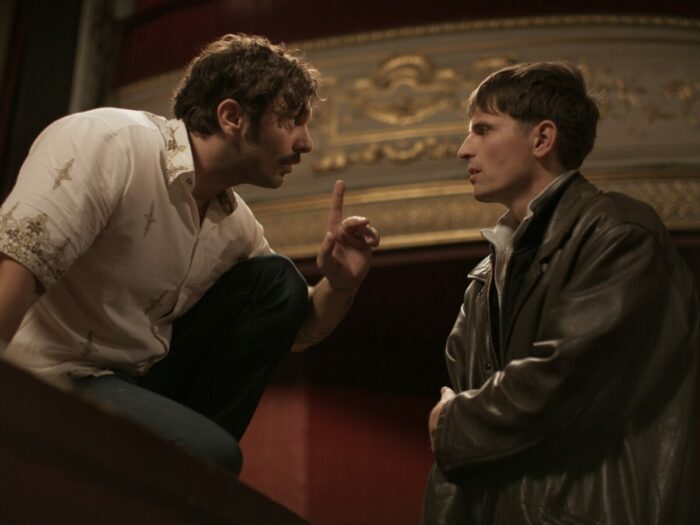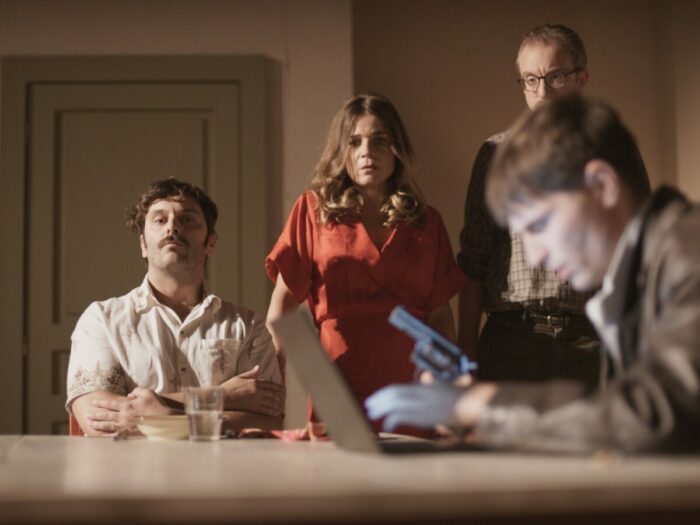Yannick is one of the more recent films by prolific French auteur Quentin Dupieux, starring Raphaël Quenard as the titular night watchman who has taken the night off to see a “kitchen sink” theater production called Le Cuco (The Cuckold). The whole of Yannick takes place inside the small theater, with the film opening on a theatrical frame of the play within the film. We watch from behind the heads of the audience, as mildly entertained as the audience seems by the developing conflict and circular dialogue.
Around five minutes in we’re introduced to Yannick, who stands up and begins to address the actors and audience about his dissatisfaction with the production. The camera reverses its gaze from the play to the audience. What Yannick says in this catalyst moment introduces the central problem of the film, and, in a bit grander sense, the problem between audiences and the theatrical arts dating back to Aristotle. Yannick—later noting that his name translates as “Grace of God” in Hebrew—states to the actors and fellow patrons:
Don’t get offended, but I don’t find this entertaining. Sorry to be blunt. It can’t be nice to hear, but I paid for something entertaining, and I’m supposed to feel good. It feels quite the opposite. You’re adding to my problems, not making me forget mine.
In this moment, Yannick emerges as a fascinating—dare I say, almost realist—detour in Dupieux’s filmography, and easily ranks among his very best.

As Dupieux’s films go, we might expect some disruption. The difference in Yannick is that the disruption isn’t a surrealist absurdity or a twisted version of magical realism, even though the expectation of something like that occurring feels imminent. Spoiler: it never really does. Keep in mind, Dupieux first gained recognition for his 2010 film Rubber, which featured a car tire in the title role of a killer on the loose. Since that early feature Dupieux’s movies have covered a wild variety of similarly strange scenarios, including a midlife crisis satire involving a sentient deerskin jacket (Deerskin, 2019), a Dumb and Dumber-esque road movie involving a captive giant housefly (Mandibles, 2020), housing market time tunnels (Incredible But True, 2022), and Power Ranger parody (Smoking Causes Coughing, 2022). Surreal and sometimes absurd, to be sure, but in a way that feels more rooted in the philosophy and ambitions of Surrealist and Absurdist traditions than a simple tendency toward weirdness for the sake of being weird.
Dupieux’s output is increasingly difficult to keep up with, rising to near-Hong Song-soo levels of frequency, with a similarly independent ethic and momentum. In fact, only a few days ago, his latest film The Second Act opened the Cannes film festival, featuring his most star-studded ensemble yet: Léa Seydoux, Louis Garrel, Vincent Lindon, and, once again, Quenard. The pace of Dupieux’s output is key to getting at the character of his work. While not every film hits, his filmography has become increasingly resonant and assured, especially across his films of the last few years, which seem to have a renewed confidence of technique and the ideas at hand. His modus operandi is to keep moving to the next idea, letting the sparks created fly where they may, all while maintaining a personalized touch on most aspects of production—writing, shooting, directing, and editing each film himself.
Compared to the “stories-within-stories” structure of something like Smoking Causes Coughing, Yannick is a fairly simple chamber piece, with some of the suspended drama relying on whether Yannick is part of the actual play, or maybe even a meta-element of the film. The film is partly sustained by our—and the now-cuckolded audience’s–interest in finding out if this is possibly an elaborate piece of performance art. Yannick is expelled from the house after reiterating his dissatisfaction, explaining the expense he incurred in coming to the production—a 45-minute train ride, a 15 minute walk—and that he’s not feeling mentally stable. Eventually, Yannick decides to charge back into the theater, only to find the actors indulging in improvisationally mocking Yannick for his outburst. It’s at this point that the drama escalates, as Yannick takes the theater hostage at gunpoint and endeavors to re-write the production into something that might satisfy his taste. His awkward act of public, spontaneous playwriting is particularly memorable, accompanied by Dupieux’s hilariously minimalist piano score.

Will Yannick succeed in writing and producing something that suits his working-class sensibility and not make him feel robbed of joy on his only night off? Will everyone get out of this unharmed? And whose side are we on? The “artist” or the “audience”? There are ultimately some narrative conclusions made around some of these questions, as well as a touch of productive ambiguity. And the film gets it done in around 65 minutes (minus the credits). The brevity of the film is an aspect worth noting, perhaps, as a commentary on how some moviegoers have recently turned runtimes into their own absurd Yannick-esque crusade (I recently saw someone wearing a hat at an AMC that said “Make Movies Shorter,” a funny, if not a bit sad, reflection on the state of critical feedback in itself).
The final moments of Yannick evoke a broken variation on the Preston Sturges film Sullivan’s Travels, which never quite convinced in its populist sentimentality, but always felt more like it masked some unresolved concern of the film. Yannick also ultimately serves as a rumination on the recent reluctance of critics and audiences–all seemingly one-in-the-same in the online age, and, perhaps, about to all be usurped by artifice–to admit to being “entertained” by movies or plays that are unpleasant, difficult, or simply just not good fun. With this in mind, Yannick’s actions, while brazen and a bit unusual, feel more like an accurate reflection of a culture that’s lost the capacity to deal with anything the least bit dark, or “liveness,” in general.
Ultimately, the conversation at the heart of Yannick about escapism and art (which, it should be noted, “Le Cuco” is likely not the highest example) is quite an old debate, and not one confined to any particular era, even though the central character might be read as a particularly current manifestation of masculinity and class in crisis. In fact, the character of Yannick brought to mind a slightly less menacing counterpart to George MacKay’s recent “incel” turn in Bertrand Bonello’s The Beast. Yannick is ultimately more sympathetic than that character though, which is not to say the movie ultimately sides with him, or any of the characters, be they actors or audience. Instead, the impact of Yannick, and the artistry of Dupieux, is how deftly and economically it raises questions worth considering—what are we owed by the art we consume? And what’s the use of “art” at all, especially to the exploited, overworked, and wounded? Yannick is a stand-out in Dupieux’s unrelenting filmography, demonstrating his ability to make these questions resonant apart from his absurdist tendencies.





Enjoyed the review. I was wondering how this film was going to land. I feel the same about the long run time of films lately. The “make movies shorter” hat you mentioned is pretty funny. Definitely going to give this film a look.